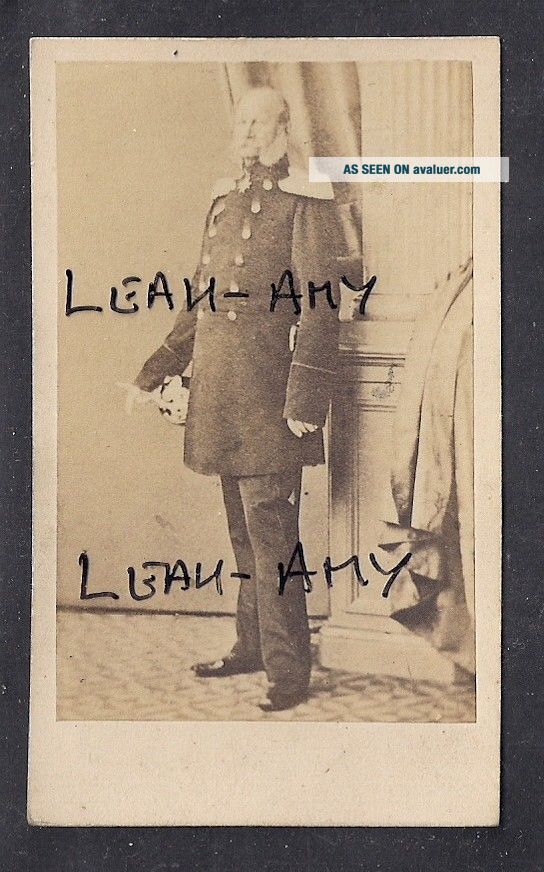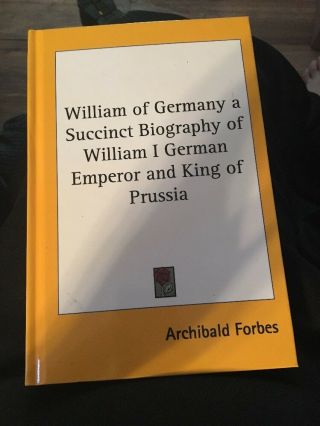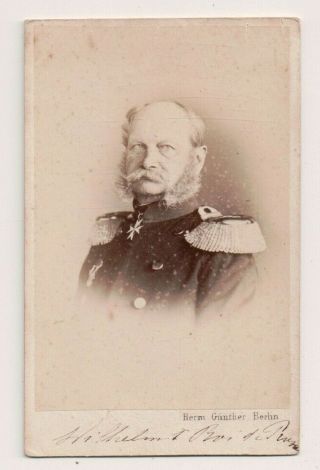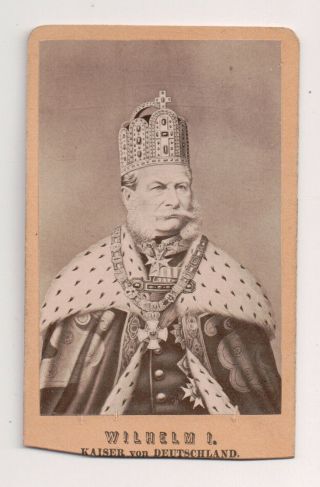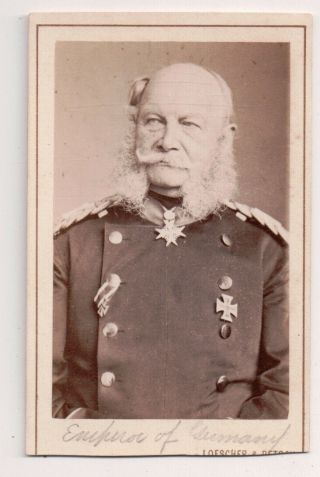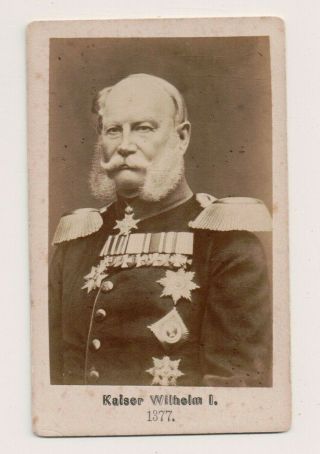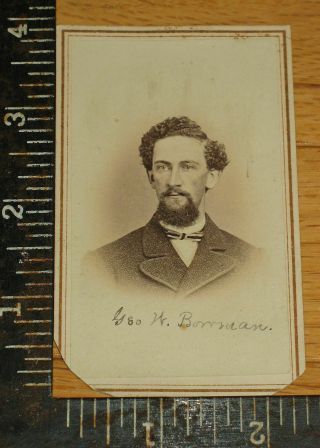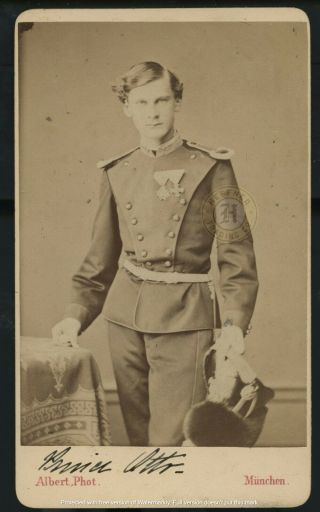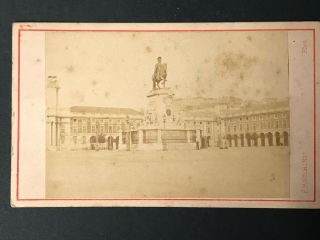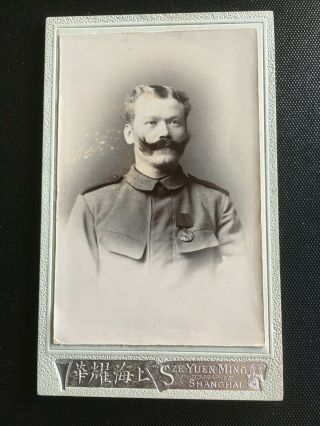OLD CDV OF WILLIAM 1st, GERMAN EMPEROR.
Item History & Price
| Reference Number: Avaluer:3527106 | Photo Type: CDV |
ORIGINAL OLD CDV OF WILLIAM 1stGERMAN EMPEROR.
PHOTO BY L HAASE, BERLIN.
FOR CONDITION SEE SCANPOSTAGE WILL BE £1.15 WITHIN THE UK & £3.60 WORLDWIDEWILL COMBINE POSTAGE ON MORE THAN ONE ITEM. PLEASE NOTE THAT THE LEAH-AMY DOES NOT APPEAR ON THE ORIGINAL IMAGE BUT IS ON THE SCAN TO PROTECT THE WINNING BIDDER FROM THOSE WHO TAKE COPIES FROM EBAY.
Additional return policy details: IF NOT HAPPY WITH ITEM PLEASE RETURN WITHIN SEVEN DAYS FOR REFUND. ALL I A...SK IS THAT YOU PAY POSTAGE TO RETURN ITEM.
FOUND THIS INFORMATION ON THE WEB
William I, German Emperor
William I, [2] or in German Wilhelm I.[3] (full name: William Frederick Louis ofHohenzollern, German:Wilhelm Friedrich Ludwigvon Hohenzollern, 22March 1797 – 9 March 1888), of the House of Hohenzollern, was King of Prussia from 2 January 1861 andthe first GermanEmperor from 18 January 1871 to his death, the first head of state of a united Germany. Under the leadershipof William and his Minister President Ottovon Bismarck, Prussiaachieved the unification of Germany and theestablishment of the GermanEmpire. Despite his long support of Bismarck as Minister President, William held strong reservations about some of Bismarck's more reactionary policies, including his anti-Catholicism and tough handling ofsubordinates. In contrast to the domineering Bismarck, William was described aspolite, gentlemanly and, while staunchly conservative, he was more open to certain classicalliberal ideas than his grandson Wilhelm II.
Earlylife and military career[edit]
The future king and emperor wasborn William Frederick Louis of Prussia (Wilhelm Friedrich Ludwig vonPreußen) in the Kronprinzenpalaisin Berlin on 22 March 1797. As the second son of Louise of Mecklenburg-Strelitzand Prince Frederick William, himself son of King Frederick William II, William was not expected to ascend to the throne. His grandfather died the yearhe was born, at age 53, in 1797, and his father Frederick William III becameking. He was educated from 1801 to 1809 by JohannFriedrich Gottlieb Delbrück [de], who was also in charge of the educationof William's brother, the Crown Prince Frederick William. At agetwelve, his father appointed him an officer in the Prussian army.[4] The year 1806 saw the defeat of Prussiaby France and the end of the HolyRoman Empire. William served in the army from1814 onward. Like his father he fought against Napoleon I of France during thepart of the NapoleonicWars known in Germany as the Befreiungskriege ("Wars ofLiberation", otherwise known as the War of the Sixth Coalition), andwas reportedly a very brave soldier. He was made a captain (Hauptmann)and won the Iron Crossfor his actions at Bar-sur-Aube.The war and the fight against France left a lifelong impression on him, and hehad a long-standing antipathy towards the French.[4] In 1815, William was promoted tomajor and commanded a battalion of the 1. Garderegiment. He fought underGebhard Leberecht von Blücherat the Battles of Lignyand Waterloo.[4] He became a diplomat, engaging indiplomatic missions after 1815.[citation needed] In 1816, William became thecommander of the Stettiner Gardelandwehrbataillon and in 1818 waspromoted to Generalmajor. The next year, William was appointed inspectorof the VII. and VIII. Army Corps. This made him aspokesman of the Prussian Army within the House of Hohenzollern. He argued infavour of a strong, well-trained and well-equipped army. In 1820, Williambecame commander of the 1. Gardedivision and in 1825 was promoted tocommanding general of the III. Army Corps.[4] In 1826 William was forced toabandon a relationship with ElisaRadziwill, his cousin whom he had been attracted to, when it wasdeemed an inappropriate match by his father. It is alleged that Elisa had anillegitimate daughter by William who was brought up by Joseph and CarolineKroll, owners of the KrollOpera House in Berlin, and was given the name Agnes Kroll. Shemarried a Carl Friedrich Ludwig Dettman (known as “Louis”) and emigrated to Sydney, Australia, in 1849. They had a family of three sons and two daughters. Agnesdied in 1904.[5] In 1829, William married Princess Augusta, thedaughter of Grand Duke Karl Friedrich ofSaxe-Weimar-Eisenach. Their marriage was outwardly stable, but not avery happy one.[6] In 1840 his older brother becameKing of Prussia. Since he had no children, William was first in line to succeedhim to the throne and thus was given the title Prinz von Preußen.[4] Against his convictions but out ofloyalty towards his brother, William signed the bill setting up a Prussianparliament (Vereinigter Landtag) in 1847 and took a seat in the upperchamber, the Herrenhaus.[4] During the Revolutions of 1848, William successfully crushed a revolt in Berlin that was aimed at FrederickWilliam IV. The use of cannons made him unpopular at the time and earned himthe nickname Kartätschenprinz (Prince of Grapeshot).Indeed, he had to flee to England for a while, disguised as a merchant. Hereturned and helped to put down an uprising in Baden, wherehe commanded the Prussian army. In October 1849, he became governor-general of Rhineland and Westfalia, with a seat at theElectoral Palace in Koblenz.[4][6] During their time at Koblenz, William and his wife entertained liberal scholars such as the historian Maximilian Wolfgang Duncker, August von Bethmann-Hollweg and Clemens Theodor Perthes [de]. William's opposition to liberal ideasgradually softened.[4] In 1854, the prince was raised tothe rank of a field-marshal and made governor of the federal fortressof Mainz.[7] In 1857 Frederick William IV suffered a strokeand became mentally disabled for the rest of his life. In January 1858, Williambecame Prince Regent for his brother, initially onlytemporarily but after October on a permanent basis. Against the advice of hisbrother, William swore an oath of office on the Prussian constitution andpromised to preserve it "solid and inviolable". William appointed aliberal, Karl Anton vonHohenzollern-Sigmaringen, as Minister President and thus initiatedwhat became known as the "New Era" in Prussia, although there wereconflicts between William and the liberal majority in the Landtag on matters of reforming thearmed forces.[4] King[edit]On 2 January 1861, FrederickWilliam IV died and William ascended the throne as William I of Prussia. InJuly a student from Leipzig attempted to assassinate William, but he was onlylightly injured.[4] Like Frederick I of Prussia, Williamtravelled to Königsbergand there crowned himself at the Schlosskirche.[6] William chose the anniversary of theBattle of Leipzig, 18 October, for this event, which was the first Prussiancrowning ceremony since 1701 and the only crowning of a German king in the 19thcentury.[4] William refused to comply with hisbrother's wish, expressed in Frederick William's last will, that he shouldabrogate the constitution.[4] William inherited a conflictbetween Frederick William and the liberal Landtag. He was considered to bepolitically neutral as he intervened less in politics than his brother. In 1862the Landtag refused an increase in themilitary budget needed to pay for the already implemented reform of the army.This involved raising the peacetime army from 150, 000 to 200, 000 men and boostthe annual number of new recruits from 40, 000 to 63, 000. However, the trulycontroversial part was the plan to keep the length of military service (raisedin 1856 from two years) at three years.[8] When his request, backed by his Ministerof War Albrechtvon Roon was refused, William first considered abdicating, but hisson, the Crown Prince, advised strongly against it.[8] Then, on the advice of Roon, Williamappointed Ottovon Bismarck to the office of Minister President in order toforce through the proposals.[4] According to the Prussian constitution, the Minister President was responsible solely to the king, not to the Landtag.Bismarck, a conservative PrussianJunker and loyal friend of the king, liked to see his workingrelationship with William as that of a vassal to his feudal superior. Nonetheless, it was Bismarck who effectively directed the politics, domestic as well asforeign; on several occasions he gained William's assent by threatening toresign.[9] During his reign, William was thecommander-in-chief of the Prussian forces in the Second Schleswig War against Denmark in1864 and the Austro-Prussian War in 1866. After thelatter was won by Prussia, William wanted to march on to Vienna and annexAustria, but was dissuaded from doing so by Bismarck and Crown Prince Frederick.[4] Bismarck wanted to end the war quickly, so as to allow Prussia to ally with Austria if it needed to at a later date;Frederick was also appalled by the casualties and wanted a speedy end tohostilities. During a heated discussion, Bismarck threatened to resign ifWilliam continued to Vienna; Bismarck got his way. In 1867, the North German Confederation wascreated as a federation (federally organised state) of the North German andCentral German states. William became the bearer of the Bundespräsidium, the federal presidium.Not expressis verbis, but in function he was the head of state. Bismarckintentionally avoided a title such as Präsident as it sounded toorepublican.[10] William became also the constitutional Bundesfeldherr, the commander of all federal armed forces. Via treaties with the South Germanstates, he also became commander of their armies in times of war. In 1870, during the Franco-Prussian War, William was incommand of all the German forces at the crucial Battleof Sedan.[4] GermanEmperor[edit]During the Franco-Prussian War, the South Germanstates joined the North German Confederation. The country was renamed DeutschesReich (the German Empire), and the title of Bundespräsidium wasamended with the title Deutscher Kaiser (German Emperor). This wasdecided on by the legislative organs, the Reichstag and Bundesrat, and Williamagreed to this on 18 December in the presence of a Reichstag delegation. The new constitutionand the title of Emperor came into effect on 1 January 1871.[11] William, however, hesitated toaccept the constitutional title, as he feared that it would overshadow his owntitle of Prussian king. He also wanted it to be Kaiser von Deutschland("Emperor of Germany"), but Bismarck warned him that the South Germanprinces and the Emperor of Austria might protest.[12][13] William eventually—thoughgrudgingly—relented and on 18 January, in the Hall of Mirrorsin the Palace of Versailles, he was proclaimedKaiser Wilhelm. The date was chosen as the coronation date of the firstPrussian king in 1701. In the nationalmemory, 18 January became the day of the foundation of the Empire (Reichsgründungstag), although it did not have a constitutional significance.[13] In 1872 he arbitrated a boundarydispute between Great Britain and the United States, deciding in favor of theU.S. and placing the San Juan Islands of Washington State within U.S. nationalterritory, thus ending the 12-year bloodless PigWar.[14] In his memoirs, Bismarckdescribes William as an old-fashioned, courteous, infallibly polite gentlemanand a genuine Prussian officer, whose good common sense was occasionallyundermined by "female influences". This was a reference to William'swife, who had been educated by, among others Johann Wolfgang von Goethe andwas intellectually superior to her husband. She was also at times veryoutspoken in her opposition to official policies as she was a liberal.[6] William, however, had long been stronglyopposed to liberal ideas.[4] Despite possessing considerable power asKaiser, William left the task of governing mostly to his chancellor, limitinghimself to representing the state and approving Bismarck's every policy.[4] Assassinationattempts and Anti-Socialist laws[edit]On 11 May 1878, a plumber namedEmil Max Hödelfailed in an assassination attempt on William in Berlin.Hödel used a revolver to shoot at the then 81-year-old Emperor, while he andhis daughter, Princess Louise, paraded in theircarriage on Unterden Linden.[4] When the bullet missed, Hödel ran acrossthe street and fired another round which also missed. In the commotion one ofthe individuals who tried to apprehend Hödel suffered severe internal injuriesand died two days later. Hödel was seized immediately. He was tried, convicted, sentenced to death, and executed on 16 August 1878.[15]
A second attempt to assassinateWilliam I was made on 2 June 1878 by Dr. KarlNobiling. As the Emperor drove past in an open carriage, theassassin fired two shots from a shotgun at him from the window of a house offthe Unter den Linden.[4] William was severely wounded and wasrushed back to the palace. Nobiling shot himself in an attempt to commitsuicide. While William survived this attack, the assassin died from hisself-inflicted wound three months later.[citation needed]
Despite the fact that Hödel hadbeen expelled from the Social Democratic Party, his actions were used as a pretext by Bismarck to ban the party through the"Anti-Socialist Law" in October1878. To do this, Bismarck partnered with LudwigBamberger, a Liberal, who had written on the subject of Socialism, "If I don’t want any chickens, then I must smash the eggs." No one inthe Social-Democratic Party even knew of Karl Nobiling, but that is not to saythat he was not politically motivated. These attempts on William's life thusbecame the pretext for the institution of the Anti-Socialist Law, which wasintroduced by Bismarck’s government with the support of a majority in the Reichstag on 18 October 1878, forthe purpose of fighting the socialist and working-class movement. Theselaws deprived the Social Democratic Party of Germany of its legal status;prohibited all organizations, workers’ mass organizations and the socialist andworkers’ press; decreed confiscation of socialist literature; and subjectedSocial-Democrats to reprisals. The laws were extended every 2–3 years. Despitethe reprisals the Social Democratic Party increased its influence among themasses. Under pressure of the mass working-class movement the laws wererepealed on 1 October 1890.[citation needed]
Lateryears and death[edit]
In August 1878, Russian Tsar Alexander II, William's nephew, wrote a letter (known as Ohrfeigenbrief) to him complaining about thetreatment Russian interests had received at the Congress of Berlin. In response William, his wife Augusta, and his son the crown prince travelled to Russia (against theadvice of Bismarck) to mend fences in face-to-face talks. However, by onceagain threatening to resign, Bismarck overcame the opposition of William to acloser alliance with Austria. In October, William agreed to the Dual Alliance (Zweibund) betweenGermany and Austria-Hungary, which was directed against Russia.[4] Another assassination attemptfailed on 18 September 1883 when William unveiled the Niederwalddenkmalin Rüdesheim. A group of anarchists hadprepared an attack using dynamite which failed due to the wet weather.[4] Despite the assassinationattempts and William's unpopular role in the 1848 uprising, he and his wifewere very popular, especially in their later years. Many people considered themthe personification of "the old Prussia" and liked their austere andsimple lifestyle.[4][6] William died on 9 March 1888 in Berlinafter a short illness. He was buried on 16 March at the Mausoleum at Park Charlottenburg. To honour him a large number ofmemorials/statues were erected all over the country over the following years.The best-known among them are the Kyffhäuser monument (1890–96) in Thuringia, the monument at PortaWestfalica (1896) and the mounted statue of William at the Deutsches Eck in Koblenz (1897). The statuenext to the Stadtschloss, Berlin (1898) wasmelted down by the government of East Berlin in 1950.[4] From 1867 to 1918 more than 1, 000memorials to William I were constructed
00011



